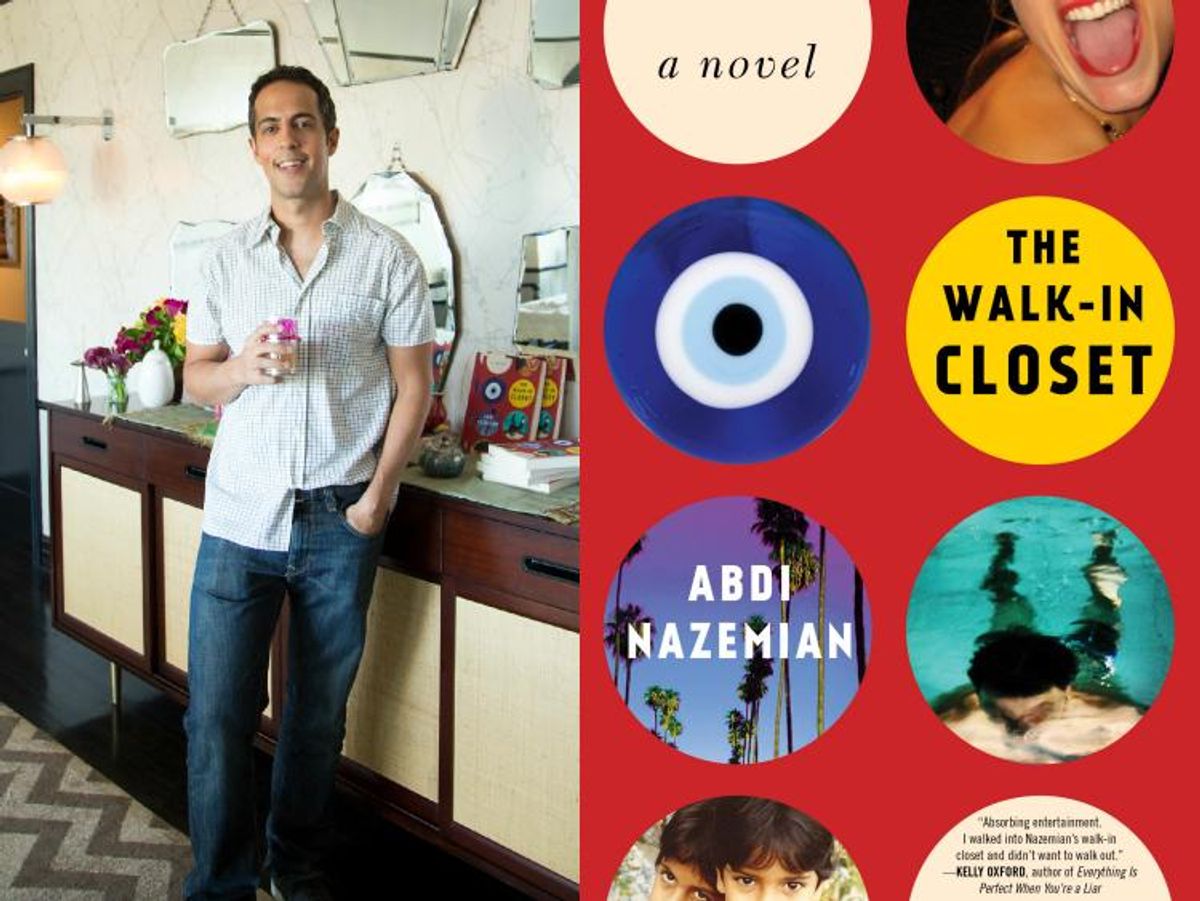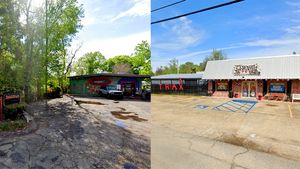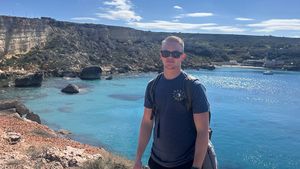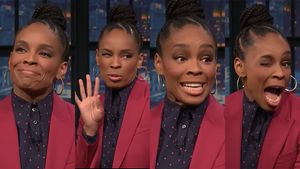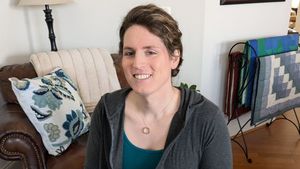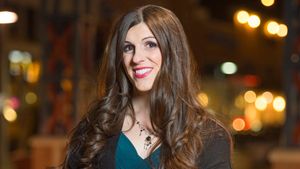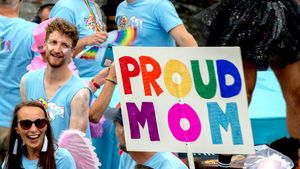Photo by Yves Laroque
For Abdi Nazemian, being included in the Debut LGBT Fiction category at the 27th Annual Lambda Literary Awards, held at Cooper Union earlier this month, was reason enough to jet across the country. But, surprising himself the literary newcomer took home the Lammy for The Walk-In Closet, a novel about the gay Iranian-American experience. We spoke with Nazemian about the book, his win, and what he hopes will come from it.
Out: Could you talk a little bit about your background?
Abdi Nazemian: I was born in Iran. My family left when I was two years old, around the time of the Revolution [1979], and we moved around a lot--we were in France for five years, then Canada for three, and then settled in the New York area. My family still lives in New York, but I've been in Los Angeles now for 16 years, working primarily as a screenwriter.
With The Walk-In Closet, what was the story you wanted to tell?
I started to write this book because I had been working in TV for so long, and I had always wanted to write about Iranian characters and Iranian families, because that's who I am and that's my story. I'd often write scripts that revolved around Iranian characters, and people liked them, but they never got made. I think a lot of the reason is because it's very hard to cast Iranian characters. So I started to think that if I wanted to tell this story and get it out there, I might have to switch to a different medium, and I've always loved books, so I just had this sort of 'ah ha' moment. When you write a book, there's no casting, nobody can say, 'Oh who are you going to get to play this gay Iranian family?'
Into the process, I had this revelation that I wanted the main character to be an outsider, so that I could narrate it from someone who doesn't know this world and was really enamoured by it. So the main character of the book is a woman, who's about to turn 30, and is kind of an honorary member of this fabulous Iranian family in Los Angeles. Through her, we experience the culture, all of its traditions and crazy rules. That was really fun for me. It gave me a reason to rediscover and re-appreciate my own culture and view it from the outside. The title of the book is The Walk-In Closet, and the idea of it is that this female character has been pretending to be the girlfriend of her gay, Persian best friend since high school. She fell into this lie, and I love the idea that she walks into his closet--yes, it's a beautiful closet, but it's still a closet, and because she's living this lie, she starts to exhibit the behavior of anybody who's hiding part of their identity.
Did you build off your own experience with Iranian family and culture?
Yes and no. The book is nothing like my personal experience. My family is very different from the one I wrote about, but on an emotional level, the story builds off extreme versions of some of the emotions I might have felt, or certain paths that I might have taken. In a lot of the book, I think I'm lovingly satirizing Iranian culture, and I say that because there's so much love for it in the book. I grew up in this culture my whole life, which meant that, in a lot of ways, I was an outsider. Because I was raised with one set of values at home and in my community, and a completely different set of values in school and the outside world. The thing about Persians is they've basically recreated a microcosm of 1970s Iran in their homes and communities. It's not like modern day America. It's a completely different place, which is fabulous, but also has a lot of quite archaic traditions... they're not the most accepting towards LGBT issues, so I definitely was drawing upon that a lot in my writing.
What do you hope people will take out of reading this novel?
My first hope is that people will just enjoy it and laugh--the novel is a comedy, and I want to put a smile on people's faces. But I also think there is a lot of conversation that needs to be had within immigrant communities about gay issues. I feel like they're sometimes lost in the larger discourse of how much progress America has made. But if you look in certain immigrant communities, we haven't gotten quite as far, whether Iranian or different Asian communities. There's a lot of discussion that needs to be had in these communities, and that's ultimately what I would love for this book to do: spark dialogue.
I think my favorite thing--other than winning a Lambda Award, of course--that came from this book was this one evening. An older Iranian woman asked me to come to her house and talk to some of her friends. I thought it was just going to be this tiny group, but it ended up being this huge group of older Iranians. She's very progressive, and she wanted to have this discussion with other members from older generations. And some of their questions, some of the things they were saying, were difficult to hear. They still have a long way to come to being open-minded, but they were engaging. For me, it felt like I had this very important role to play within my own community, and that was really gratifying. There aren't a lot of out, gay Iranians. Actually, I've been told that this is the first Iranian novel to deal with a gay Iranian character in any depth.
Do you still have family in Iran?
I do. I actually have a cousin staying with me for the next month. She lives in Iran, but comes here every summer. The thing about Iran--not Iranians living in Los Angeles--is that it's nothing like what you hear in the news. Iran is this vibrant, cosmopolitan place with people who have lives that are very different from what I think people expect.
Among your family and friends in Iran, have reactions to your book been different from those outside?
I wouldn't say that it's that different. My family in Iran, they're well-traveled people. I'm sure you could show this book to some people in Iran and they would be absolutely horrified, they'd want me executed! But my family who live in Iran travel the world, are very involved in the arts, and I think their reactions would be very similar to my friends and family who live here in the United States. In general, the Iranian community has been extremely supportive. I think they enjoy the novel, but they have to get past the sort of discomfort that I'm talking about being gay. I think that is pushing some people a little bit out of their comfort zone, but my generation has to to do that for our community.
Who have been some of your literary influences?
My literary influences... God, that's a hard one. I have people that I kind of worship, like James Baldwin, but I don't think our writing has many similarities. And then I really like writers who deal with other cultures, like Amy Tan. Even though she's not writing about my culture, she brings to life her own. I love writers like that, who can really represent their own communities.
And how does it feel to have won a Lammy with your first novel?
It's gratifying. Writing is hard--I love it, but it's a hard life. Writing a book like this, I knew it was never going to end up on a best-seller list, so to win this is just a really unexpected surprise, it's a validation of something that was just a personal journey for me. I never expected the novel to have this much of a life in the outside world, and this just proves to me that the more you write from the heart, and the more you do things that matter to you, the more it will resonate. It was a good lesson for me to learn.
